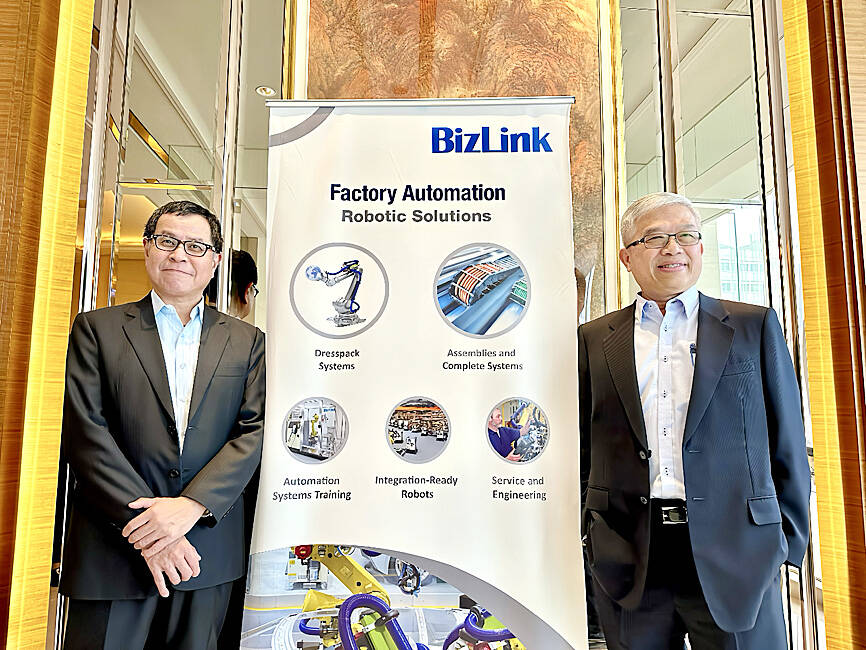Wire harness maker BizLink Holding Inc (貿聯控股) yesterday reported its highest earnings per share in seven quarters as it announced the acquisition of electrical equipment maker Easys s.r.o.
BizLink’s earnings per share for the second quarter of the year were NT$6.13, the highest since the third quarter of 2022, when it was NT$7.64, company data showed.
That came as the company’s net profit in the second quarter rose by 72.64 percent from NT$580.67 million (US$18.25 million) the previous quarter to NT$1.002 billion. On an annual basis, net profit surged 127.32 percent from NT$440.99 million, the company said in an earnings report.

Photo: Fang Wei-chieh, Taipei Times
While second-quarter revenue only grew 4.5 percent from the previous quarter and was flat from a year earlier at NT$12.98 billion, BizLink said its earnings growth was attributable to “ongoing efficiency and productivity efforts as well as favorable product mix,” which helped boost its gross margin to a 7.5-year high at 28.11 percent and raise its operating margin to a double-digit percentage again at 11.42 percent.
“The global operating environment remained challenging given rising geopolitical and macro-economic risks, but our strong execution showed through,” BizLink said.
The company said its strong bottom line allowed it to generate positive free cash flow for the seventh consecutive quarter last quarter.
“Our healthy cash balance gives us more room to make strategic moves to allocate capital for various growth projects, engage in [merger and acquisitions] M&A and continue to deleverage,” it said.
BizLink, which supplies wiring harnesses for battery management systems in Tesla Inc’s electric vehicles, said sales generated by its industrial applications segment accounted for 40 percent of total sales last quarter, followed by the information technology (IT) and data communications business’ 23 percent, 18 percent each from the automotive and electrical appliances segments, and 1 percent from other segments.
The industrial applications segment might see sales begin to grow this quarter, on the back of rising demand for capital equipment and tailor-made products, while factory automation and healthcare businesses are expected to bottom in the second half of the year, the company said.
In addition, the outlook for the IT and data communications segment looks promising, the company said, adding that US cloud service providers have allotted for more spending in new data center infrastructure and servers worldwide, which would boost data and power solutions sales.
However, BizLink said it remains conservative on the automotive segment given the ongoing industry downcycle, despite initial signs of bottoming.
The company also said it is to acquire Easys for 51.5 million euros (US$57.54 million), which would bolster its ability to fulfill semiconductor capital equipment demand using the additional capacity and new capabilities in Eastern Europe, adding that it expects to sign the definitive purchase agreement to wholly own Easys before the middle of next month.
In the first half of the year, its net profit was NT$1.58 billion, up 48.22 percent from a year earlier, earnings per share rose from NT$6.76 to NT$9.69 and revenue fell 0.83 percent to NT$25.46 billion, company data showed.

Semiconductor shares in China surged yesterday after Reuters reported the US had ordered chipmaking giant Taiwan Semiconductor Manufacturing Co (TSMC, 台積電) to halt shipments of advanced chips to Chinese customers, which investors believe could accelerate Beijing’s self-reliance efforts. TSMC yesterday started to suspend shipments of certain sophisticated chips to some Chinese clients after receiving a letter from the US Department of Commerce imposing export restrictions on those products, Reuters reported on Sunday, citing an unnamed source. The US imposed export restrictions on TSMC’s 7-nanometer or more advanced designs, Reuters reported. Investors figured that would encourage authorities to support China’s industry and bought shares

TECH WAR CONTINUES: The suspension of TSMC AI chips and GPUs would be a heavy blow to China’s chip designers and would affect its competitive edge Taiwan Semiconductor Manufacturing Co (TSMC, 台積電), the world’s biggest contract chipmaker, is reportedly to halt supply of artificial intelligence (AI) chips and graphics processing units (GPUs) made on 7-nanometer or more advanced process technologies from next week in order to comply with US Department of Commerce rules. TSMC has sent e-mails to its Chinese AI customers, informing them about the suspension starting on Monday, Chinese online news outlet Ijiwei.com (愛集微) reported yesterday. The US Department of Commerce has not formally unveiled further semiconductor measures against China yet. “TSMC does not comment on market rumors. TSMC is a law-abiding company and we are

FLEXIBLE: Taiwan can develop its own ground station equipment, and has highly competitive manufacturers and suppliers with diversified production, the MOEA said The Ministry of Economic Affairs (MOEA) yesterday disputed reports that suppliers to US-based Space Exploration Technologies Corp (SpaceX) had been asked to move production out of Taiwan. Reuters had reported on Tuesday last week that Elon Musk-owned SpaceX had asked their manufacturers to produce outside of Taiwan given geopolitical risks and that at least one Taiwanese supplier had been pushed to relocate production to Vietnam. SpaceX’s requests place a renewed focus on the contentious relationship Musk has had with Taiwan, especially after he said last year that Taiwan is an “integral part” of China, sparking sharp criticism from Taiwanese authorities. The ministry said

US President Joe Biden’s administration is racing to complete CHIPS and Science Act agreements with companies such as Intel Corp and Samsung Electronics Co, aiming to shore up one of its signature initiatives before US president-elect Donald Trump enters the White House. The US Department of Commerce has allocated more than 90 percent of the US$39 billion in grants under the act, a landmark law enacted in 2022 designed to rebuild the domestic chip industry. However, the agency has only announced one binding agreement so far. The next two months would prove critical for more than 20 companies still in the process